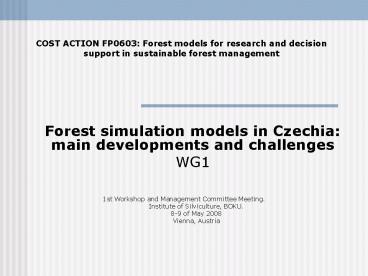Forest simulation models in Czechia: main developments and challenges
Title: Forest simulation models in Czechia: main developments and challenges
1
COST ACTION FP0603 Forest models for research
and decision support in sustainable forest
management
- Forest simulation models in Czechia main
developments and challenges - WG1
1st Workshop and Management Committee
Meeting.Institute of Silviculture, BOKU.8-9 of
May 2008Vienna, Austria
2
Main features of Czech forests
- Forest cover (total/share) 2 751 568 ha, 34,9
- Growing stock, annual growth and cuts 900
mil.m3, 16.8 m3 y-1, 72 of the annual growth is
cut - Main speciesNorway spruce (47.7 ), Pine (13.9
), other coniferous species (7.4 ), Oak (7,4
),European Beech (7,2 ), Black Locust (4. 2
), Birch (4,2 ), Larche (3,8 ), Alder (2,1 ),
European Hornbeam (1, 9 ), Ash (1,7 ), Linden
(1,6 ), Silver Fire (1.0 ). - Main non-wood products and services water source
protection, soil protection, hunting,
biodiversity, recreation - Main risks wind, pests (bark beetles, Lymantria
dispar, Armillaria ostoyae), snow, air pollution,
climate change impact. - Management and silvicultural characteristics
- simplified species and space structure of forests
- low value of original tree genotype
- air pollution of montane forests
- overpopulation of game species (deers)
3
Forest modelling approaches and trends
- Empirical models
- Main types of models developed
- Development of single tree volume models and stem
profile models (TREEMODEL) - Standing volume and step profile assessment
- Forest management and landscape planning
- 3D Forest structure
- Trends in modelling
- The trend has been towards carbon cycle in
managed forests - Water cycle and energy flow for ecosystem
(landscape) - Recent research is concentrating in
- Recent research is concentrating in
- Modelling regeneration
- Modelling carbon cycle
- Modelling water cycle and energy flow
- Web-based and GIS-based forest information system
integrated with forest model
4
Forest modelling approaches and trends
- Mechanistic models
- Not developed in Czechia
5
Modelling non-timber products and services
- ECOVAST method for the evaluation of landscape
including forest areas
6
Models for predicting risk of hazards
- If there are any models for predicting the risk
(occurrence/damage) of hazards (fires, wind,
snow, etc), list them. If not skip the slide. - Models (scenarios) for modelling risk of climate
change
7
Simulators and information systems
- List existing forest simulators or decision
support systems - Stand level simulators
- Standing volume biomass assessment (Field map,
http//www.fieldmap.cz/ - Include name and reference or web page
- Forest level decision support systems
- Include name and reference or web page
- New methodology for forest management in
structurally rich forest stands (Field map,
http//www.fieldmap.cz/ - Process based simulators
- Long-term experimental monitoring and theoretical
modelling of the surface runoff formation in the
Sumava and Jizera Mts.(BROOK90 model)(http//www.i
h.cas.cz/web_new/cs/ - Application of the forest-soil-water model
(PnET-BGC/CHESS) to the Lysina catchment (Ecol.
Modelling, 1999, 120 9-30). - Include name and reference or web page
8
Data bases/archives on forest simulation models
- Are there arny archives or data bases on forest
simulation models? List them if not skip it.
9
Research highlight
Carbon cycle in managed forests. Applying a
process model to stands of major tree species in
central-European forestry. Management of water
cycle and energy flow for ecosystem control the
energy-transport-reaction (ETR) model). Model
calculation of radiocaesium transfer into food
products in seminatural forest ecosystem in the
Czech Republic after a nuclear reactor accident
and an estimate of population dose
burden Estimates of ozone concentration and
deposition flux to coniferous and deciduous
forests Scenarios of forest management in the
Czech Republic, Hungary, Poland and
Ukraine Utilization of mathematical models and
growth simulators for creating forest management
plans and planning the tending felling
10
Research highlight
Long-term experimental monitoring and theoretical
modelling of the surface runoff formation in the
Sumava and Jizera Mts.(BROOK90 model) Application
of the forest-soil-water model (PnET-BGC/CHESS)
to the Lysina catchment Recovery from
acidification as predicted by the MAGIC model for
14 forest catchments in the Czech Republic
(Geophysical Research Abstracts, 10, 2008)
11
Future challenges
- Development of single tree volume models and stem
profile models (TREEMODEL) - Forest Focus regulation on developing harmonized
methods for assessing carbon sequestration in
European forests - Reporting of inventory of emissions by sources
and sinks for the sector Land Use, Land-use
change and Forestry (LULUCF) and Agriculture in
the Czech Republic. - Tools for Sustainability Impact Assessment of the
Forestry-Wood Chain - Incorporation of internationally harmonized
techniques of forest inventory into the
methodology of the Czech NFI - Pilot study on the use of National Forest
Inventories to downscale European forest
diversity spatial information in five test areas,
covering different geo-physical and geo-botanical
conditions
12
Innovative references
- Ciencala E., Tatarinov F. A. 2006 Application of
BIOME-BGC model to managed forest Comparison
with long-term observations of stand production
for major tree species. Forest Ecology and
Management 237 252-266. - Ciencala E., Tatarinov F., Cerny M 2006 Carbon
cycle in managed forests. Applying a process
model to stands of major tree species in
central-European forestry. Forestry Journal, 52
29-39. - Ripl W. 1995 Management of water cycle and
energy flow for ecosystem control the
energy-transport-reaction (ETR) model).
Ecological modeling, 78 61-76. - Svadlenkova M., Konecny J., Smutny V. 1996 Model
calculation of radiocaesium transfer into food
products in seminatural forest ecosystem in the
Czech Republic after a nuclear reactor accident
and an estimate of population dose burden.
Environ. Pollut., 92 173-184. - Tatarinov F. A., Ciencala E. 2006 Application of
BIOME-BGC model to managed forest Sensitivity
analysis. Forest Ecology and Management 237
267-279.































